Welcome to the April 2015 issue of the Global Washington newsletter.
IN THIS ISSUE
Letter from our Executive Director
Last week I had the opportunity to attend the Specialty Coffee Association of America’s annual expo. It’s no surprise that the SCAA gathered in Seattle; Seattleites consume more coffee than citizens of any other American city. We are home to Starbucks, have 35 coffee shops for every 100,000 residents, and spend an average of $36 per person, per month on coffee.
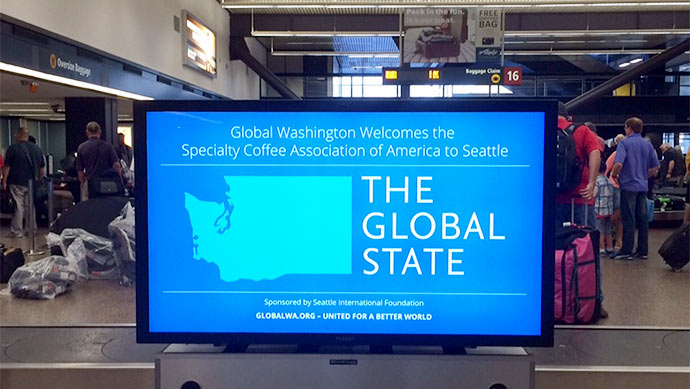 Seattle is also known for being the epicenter of international development and, given that 90% of the coffee grown around the world comes from developing countries, it’s no surprise that several Global Washington members work with coffee growers to make a more equitable, sustainable value chain. Coffee serves as the economic livelihood for over 25 million people. Challenges facing growers include a lack of access to finance, underdeveloped technical skills to combat disease, volatility of the global market and lack of access to that information, and crop vulnerability due to climate change.
Seattle is also known for being the epicenter of international development and, given that 90% of the coffee grown around the world comes from developing countries, it’s no surprise that several Global Washington members work with coffee growers to make a more equitable, sustainable value chain. Coffee serves as the economic livelihood for over 25 million people. Challenges facing growers include a lack of access to finance, underdeveloped technical skills to combat disease, volatility of the global market and lack of access to that information, and crop vulnerability due to climate change.
I hope you will take the time to learn more about Global Washington members who are improving lives for those behind each cup of coffee.

Kristen Dailey
Executive Director
Back to Top
Question of the Month
 GlobalWA will ask you a question every month and synthesize the responses and make available to our member organizations. Please take a moment to respond to the question for this month:
GlobalWA will ask you a question every month and synthesize the responses and make available to our member organizations. Please take a moment to respond to the question for this month:
Is your organization participating in GiveBIG on May 5?
Please click here to respond.
Back to Top
Coffee In the News
The Role and Impact of Coffee in Global Development
Earlier this month, Seattle played host to the Specialty Coffee Association of America (SCAA) whose annual exposition took place at the Washington State Convention Center April 9-12. Featuring a full schedule of events to promote coffee’s unique history and taste to the world, our city welcomed approximately 12,000 coffee growers, retailers, importers, exporters, NGOs, companies and government trade ministries from around the globe.
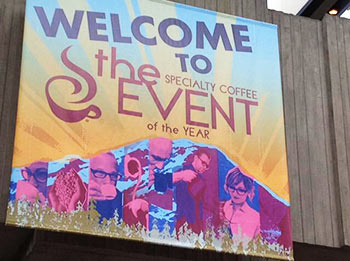 It is no surprise that the SCAA returned to Washington state, after holding their 2014 annual event in Seattle. Home to a thriving coffee culture and some of the industry’s most recognized brands, the Daily Beast recently concluded that Seattleites consume more coffee than citizens of any other American city. We have 35 coffee shops for every 100,000 residents, and we spend an average of $36 per month on coffee.
It is no surprise that the SCAA returned to Washington state, after holding their 2014 annual event in Seattle. Home to a thriving coffee culture and some of the industry’s most recognized brands, the Daily Beast recently concluded that Seattleites consume more coffee than citizens of any other American city. We have 35 coffee shops for every 100,000 residents, and we spend an average of $36 per month on coffee.
Furthermore, Seattle-based organizations continue to lead in the creation of a sustainable value chain that leads to a world-class coffee experience. As we recognize Seattle’s influence on the future of coffee, Global Washington is exploring the role of coffee in international development and looking at how GlobalWA members contribute to sustainable economic growth through innovative programs in coffee communities worldwide.
Given coffee’s role in the economies of commodity export-heavy developing countries, a sustainable approach to coffee production and trade is imperative. As the International Coffee Organization and DR Wakefield report address, the coffee industry faces a litany of challenges. The most pressing issues are disease, climate change, urbanization and the loss of farmland, fluctuating prices, an aging workforce and urban migration. The coffee industry has looked at how to address these issues in ways that support the triple bottom line of profits, people and planet.
What is sustainable coffee?
The World Commission on Environment and Development defines sustainable development as that which “meets the needs of the present without compromising the ability of future generations to meet their own needs.” Sustainable coffee comprises economic, social and environmental components that relate to the challenges facing today’s coffee industry.
Economic sustainability
The coffee industry employs roughly 100 million people worldwide, the majority of whom live in developing countries. Many small-holder farmers lack the business skills necessary to consistently produce quality coffee for the international market. Certifiers and roasters have invested in education programs since improved farming husbandry usually yields better coffee harvests and higher prices from companies looking for a stable and long-term supply of coffee. Farmers then use this money to access education, health care and food supply, thus raising their overall standard of living. Training programs also help farmers diversify their crops in order to weather price fluctuations that have historically hurt communities heavily dependent on one commodity.
Social sustainability
Once coffee production becomes more stable and economically sustainable, it can have positive spillover effects on other areas of society as cooperatives and communities invest in improved facilities, risk management tools and education. Many organizations and cooperatives focus on institutional capacity building, gender-based programs that bring women into the formal economy or microfinance projects that support the local economy as it grows around coffee. These programs provide economic and social opportunities to young people who previously had to migrate to larger cities in search of work.
Environmental sustainability
The coffee industry has been active in the environmental sustainability debate, as changes in climate inevitably affect the quality and taste of your latte. NGOs and companies are creating programs to improve farming practices and post-harvest processing, develop disease and drought-resistant varieties, enhance soil fertility and explore new production models. Whether in regards to deforestation, ocean acidification or drought, the coffee industry is exceptionally aware of the importance of a healthy environment in bringing coffee from bean to cup.
Most industry experts foresee global demand outstripping supply, especially due to growth in emerging markets like China, India, Brazil, Mexico and Indonesia. Much like the cocoa industry, coffee finds itself in a unique position. If we rely on yesterday’s solutions, we may find ourselves enduring the gray Seattle winter with neither cappuccino nor dark chocolate. Luckily, we live in a city with organizations that see coffee’s challenges as opportunities to “do well by doing good.” By strengthening the economic, social and environmental sustainability of coffee, several Global Washington members are building stronger communities along the value chain through innovative partnerships and programs that ensure the future of a product none of us want to go without.
- Bainbridge-Ometepe Sister Island Association (BOSIA) encourages mutual understanding, education, friendship, cultural and peaceful exchanges between the people of Bainbridge Island in Washington and Ometepe Island in Nicaragua. Since 1990, BOSIA has imported coffee from Ometepe. BOSIA’s Café Oro coffee is Fair Traded, shade grown and certified organic, and all of the profits are used for projects suggested by Ometepe communities. More recently, a group of people who have been involved with BOSIA since its inception opened up Tostadores de Ometepe, which is located on the island. The coffee is roasted and sold locally, helping to create jobs and generate income for local communities.
- The Bill and Melinda Gates Foundation has a variety of partners who are working in the agricultural sector and helping improve the lives of farmers. One of these partners is TechnoServe. With Foundation funding, TechnoServe has helped thousands of East African smallholder farmers enter the supply chain for specialty coffee. Through technical training and the formation of collaborative business partnerships along the coffee supply chain, TechnoServe has reached 195,408 farmers. Thousands of farmers now receive premiums on the coffee they harvest, have significantly higher incomes and have greater access to the global coffee market than ever before.
- Global Partnerships (GP) currently invests in a portfolio of 47 microfinance institutions, social business and cooperatives in Latin America and the Caribbean. One partner of GP is Crediflorida, a rural savings and credit cooperative located in the central, coffee growing region of Peru. Crediflorida provides small coffee farmers with access to tailored credit, crop-focused technical assistance and access to specialty markets. By combining credit with technical assistance, Crediflorida and Global Partnerships ensure that farmers invest in practices that will lead to improved crop quality and increased yield.
- The Grameen Foundation uses mobile technology to improve access to information for the world’s poor. Increased access to information can expand agricultural capacity, support health and food initiatives and enhance the provision of financial services. Grameen works with a range of partners in the coffee and horticultural sectors. ASOBAGRI, for example, is a local smallholder coffee grower cooperative in Guatemala. ASOBAGRI uses Grameen’s data management tools to create farmer profiles and produce information about the region. This data assists the Grameen Foundation with helping Guatemalan farmers increase their productivity and improve their business practices.
- Oikocredit is a worldwide financial cooperative that promotes global justice through microfinance. Individuals receive microloans that are of small dollar amounts and do not require collateral, allowing the client to repay in small and frequent amounts over a long period of time as they focus on growing their business. Oikocredit has financed an array of projects pertaining to coffee farmers. For example, Oikocredit granted $500,000 to the Cooperativa Agraria Cafetalera Bagua Grande, an agricultural cooperative of small-scale coffee farmers in the northern part of Peru in the Amazonas region. The money has provided training and support for coffee farmers in a region that depends on agriculture.
- Oxfam focuses on tackling the conditions that cause poverty by advocating for new laws to help the world’s poor and offering direct support to impoverished people. Throughout the years, Oxfam has supported coffee farmers and raised awareness of the importance of Fair Trade. As global coffee prices have fallen, Oxfam has supported coffee farmers in their fight for fair treatment and better wages. Oxfam’s advocacy efforts include meeting with coffee corporations to push them to adopt fair business practices, providing farmers with new technologies and necessary supplies, and raising awareness of the importance of Fair Trade.
- Seattle University (SU) is the first Fair Trade University in the Pacific Northwest, and one of only 26 schools in the country to earn the designation. As part of the University’s journey to garner Fair Trade certification, a professor collaborated with students and colleagues at the Universidad Centroamericana Managua (SU’s sister school) to develop a new fair trade coffee. In partnership with farmers in the Nicaraguan coffee farmer cooperative CECOSEMAC, the sisters schools worked together to develop Café Ambiental, which is now sold by SU. SU has completed various other projects in conjunction with coffee growers in Nicaragua, including developing a more efficient and sustainable way to treat coffee wastewater.
- Theo Chocolate is the first Organic, Fair Trade and Fair for Life chocolate factory in North America. Theo believes that chocolate can and should be produced in an entirely ethical and sustainable fashion. All of Theo’s ingredients, not just its cocoa, are certified organic and fair trade. Theo’s Coffee and Cream milk chocolate bar, for example, contains coffee from Eastern Congo. A portion of the purchase price from the sale of every bar will benefit the Eastern Congo Initiative and help farmers earn a profitable and sustainable living. Theo also has a delicious classic coffee bar, which is made with organic coffee from local roaster Café Vita.
- Woodland Park Zoo supports a variety of environmentally sustainable projects. In 2009, the Tree Kangaroo Conservation Project (TKCP) at the Zoo began partnering with local YUS landowners to help them address economic challenges. Through an existing relationship between the Zoo and Seattle-Based coffee roaster Caffe Vita, TKCP and the people of YUS began to sell Conservation Coffee on the international market. YUS farmers grow this coffee on small, sustainable plots and work together as a community to get their beans to market. The success of the program encourages other landowners to pledge their land to the YUS. More land pledges means more protection for species such as the tree kangaroo.
Back to Top
Featured Organization
Seattle University, More than Fair Trade Project
By Jeff Halvorson
Before the Specialty Coffee Association of America (SCAA) brought together major players in the coffee industry at their 27th Annual Expo in Seattle April 9-12, Seattle University (SU) embarked on its own coffee journey. Led by Professors Susan Jackels and Quan Le and in partnership with Fair Trade USA, two teams of students, faculty and alumni from SU and its Jesuit sister school, Universidad Centroamericana Managua (UCA Managua), traveled to San Antonio, a heartland of Nicaraguan coffee.
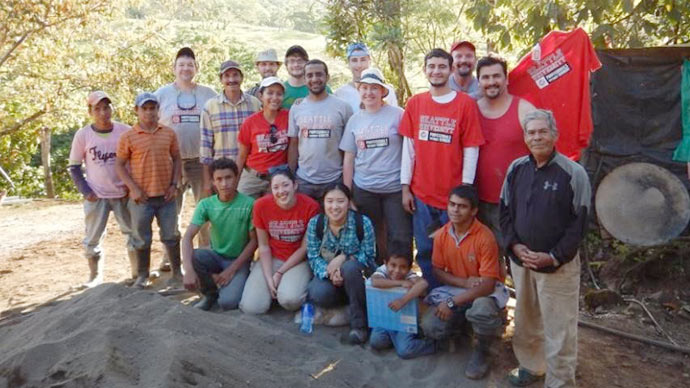 The group built a water treatment-appropriate technology for a farm in the CECOSEMAC cooperative. CECOSEMAC is a second order cooperative of over 300 smallholder coffee producers formed into six cooperatives in the Matagalpa region of Nicaragua. Upon their return to Seattle, the SU team presented findings and next steps at a campus event, mingled with other groups working in the coffee space at a GlobalWA reception, and attended various meetings and lectures at the SCAA expo.
The group built a water treatment-appropriate technology for a farm in the CECOSEMAC cooperative. CECOSEMAC is a second order cooperative of over 300 smallholder coffee producers formed into six cooperatives in the Matagalpa region of Nicaragua. Upon their return to Seattle, the SU team presented findings and next steps at a campus event, mingled with other groups working in the coffee space at a GlobalWA reception, and attended various meetings and lectures at the SCAA expo.
The SU coffee project aligns with the university’s recent distinction of becoming the first Fair Trade University in the Pacific Northwest (and one of only 26 schools in the country to earn that designation), an effort spearheaded by Professors Jackels and Le. A grant from Fair Trade Colleges and Universities USA supported the campaign, and students in the SU Global Business Club moved the initiative forward. Students worked with Fair Trade USA to interview local roasters (Café Vita and Stumptown) and importers (Atlas Coffee) and were able to take a more nuanced perspective to Nicaragua.
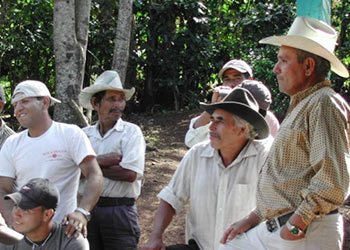 In San Antonio, the team interviewed multiple farmers and staff of CECOSEMAC to learn what it means to be a coffee farmer in Nicaragua. Braden Wild, one of the SU students involved in the project, talked about how the group began understanding the hardships farmers face, including ones stemming from Fair Trade certification. As the group learned about Fair Trade coffee from the farmers’ point of view, they began to formulate a new business model. Soon after, the More than Fair Trade project was born.
In San Antonio, the team interviewed multiple farmers and staff of CECOSEMAC to learn what it means to be a coffee farmer in Nicaragua. Braden Wild, one of the SU students involved in the project, talked about how the group began understanding the hardships farmers face, including ones stemming from Fair Trade certification. As the group learned about Fair Trade coffee from the farmers’ point of view, they began to formulate a new business model. Soon after, the More than Fair Trade project was born.
More than Fair Trade involves the purchase of organic Fair Trade coffee from CECOSEMAC for a price that includes the gap in income to the farmers due to decreased yield from organic cultivation and other requirements. In other words, the More than Fair Trade group is lowering its own margins by 25% and then passing those profits directly to CECOSEMAC as an additional premium for the green coffee, all without raising prices for consumers. This premium should motivate and support the farmers as they raise the quality of their coffee.
With the SU Global Business Club focused on the project’s business plan and marketing efforts, UCA Managua students tackled product branding and soon introduced Café Ambiental, or “Environmental Coffee.”
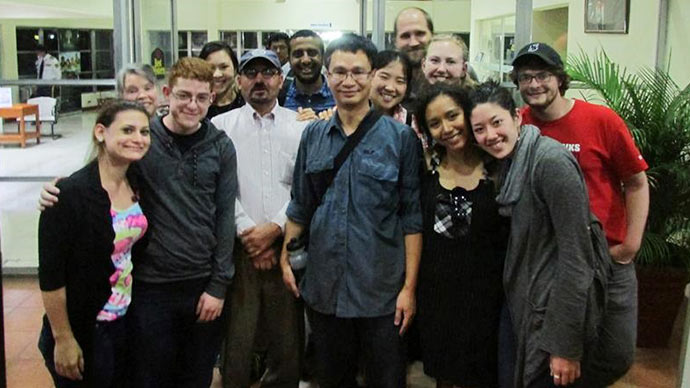 In addition to cafés on the Seattle University campus, the SU group is exploring the sale of whole beans to off-campus locations, making Café Ambiental available to a wider audience. The coffee would build upon the Fair Trade foundation of social and environmental sustainability and add a social enterprise element by providing the market incentives CECOSEMAC’s farmers need to achieve their goal of producing world-class specialty coffee. More than Fair Trade involves deep connections between producer, buyer and consumer and it offers a promising model of how to best address the challenges facing the global coffee industry.
In addition to cafés on the Seattle University campus, the SU group is exploring the sale of whole beans to off-campus locations, making Café Ambiental available to a wider audience. The coffee would build upon the Fair Trade foundation of social and environmental sustainability and add a social enterprise element by providing the market incentives CECOSEMAC’s farmers need to achieve their goal of producing world-class specialty coffee. More than Fair Trade involves deep connections between producer, buyer and consumer and it offers a promising model of how to best address the challenges facing the global coffee industry.
Back to Top
Changemaker
Alberto Solano, Regional CEO, Latin America & Caribbean, Grameen Foundation
By Jeff Halvorson
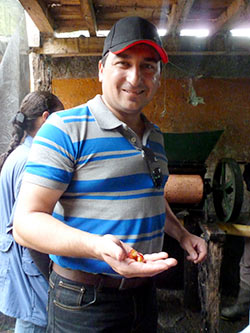 As the Regional CEO of Latin America and the Caribbean, Alberto Solano has more than twelve years of experience in microfinance. A Fellow of the Aspen Institute’s Central American Leadership Initiative, Solano has been instrumental in designing Grameen Foundation’s approach to improve the coffee value chain in Latin America. During his recent trip to Seattle, he spoke with Global Washington and the Seattle Times about mobile technology, microfinance and coffee. You can read the Seattle Times story here.
As the Regional CEO of Latin America and the Caribbean, Alberto Solano has more than twelve years of experience in microfinance. A Fellow of the Aspen Institute’s Central American Leadership Initiative, Solano has been instrumental in designing Grameen Foundation’s approach to improve the coffee value chain in Latin America. During his recent trip to Seattle, he spoke with Global Washington and the Seattle Times about mobile technology, microfinance and coffee. You can read the Seattle Times story here.
Latin America is a region that relies heavily on agriculture for sustenance and income. About 80% of the rural poor are farmers, a large portion of them earning their living from coffee. In 2012, Grameen Foundation discovered the microfinance portfolio in Latin America was 6% directed to agriculture despite having one of the most sophisticated microfinance industries in the world. This challenge presented an opportunity to leverage Grameen’s global experience in microfinance and technology to develop innovative solutions to address problems such as poverty, economic instability and low education.
By increasing the quantity and quality of demographic, income, education and farming data that relate to the realities farmers face, Grameen and its partners (e.g. Starbucks in Colombia) can gather and analyze data in a much more efficient manner. This wealth of information then allows the partners to design more tailored solutions for each farmer in the value chain. The goal is to increase the business skills and technical capacity of farmers in order to produce a higher quality and quantity of coffee that meets the expectations we have come to expect.
This approach comprises three interventions that address the principal challenges facing smallholder coffee farmers: technical training, market access and finance.
- Extension services: Grameen works through its partners to build the technical capacity and business acumen of farmers to produce consistently strong yields of high quality coffee.
- Market access: Grameen’s work has been instrumental in linking newly trained and capacitated farmers with those markets willing to spend a premium price for high quality coffee.
- Improving the commercial lending system: Grameen is working with financial institutions to better understand the risks and opportunities involved with coffee farming. With improved data, they see a more nuanced landscape of coffee farmers who represent a solid investment. A more inclusive financial market then supports farmers through tailored financial tools to help them replace aging trees and equipment or invest in disease-resistant varieties.
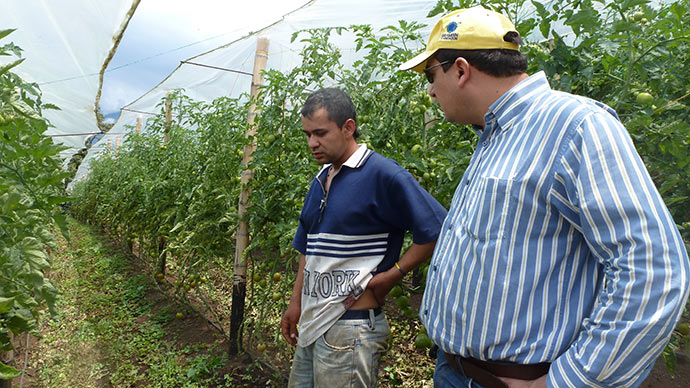 It is important to note that the goal of Solano’s team is not to turn everyone into a coffee farmer. The data collection and extension services also help determine if coffee production is a viable business model for farmers. If not, Grameen works with them to develop alternatives.
It is important to note that the goal of Solano’s team is not to turn everyone into a coffee farmer. The data collection and extension services also help determine if coffee production is a viable business model for farmers. If not, Grameen works with them to develop alternatives.
What makes this approach so powerful is that it moves beyond traditional development solutions of capacity building to work in partnership with private sector actors like Starbucks. Access to buyers willing to pay a premium price for improved products provides economic incentive to use these extension services that teach farmers to become better farmers and smarter business people.
Solano’s team recognized that training and marketplace connections were not enough to make this approach sustainable without the participation of finance institutions, especially in a world where ethically sourced coffee is no longer the exception to the rule. His work with Global Partnerships, the Central American Bank for Economic Integration, and his private sustainable development and microfinance consulting experience help Solano train banks to understand how coffee farming could be a potentially lucrative market for their services.
Redefining ‘ethical sourcing’
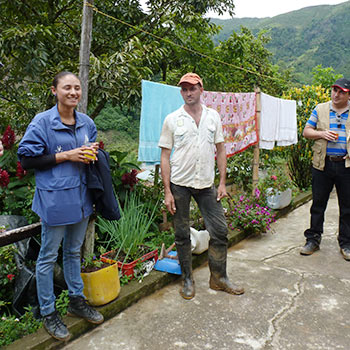 When it comes to coffee, Solano argues that ethical sourcing combines environmental and social sustainability in a way that goes beyond a mere certification label; it transforms coffee from a commodity to a human connection between farmer and consumer. In a world of large-scale plantations that achieve economies of scale but level a toll on the environment and local people, it recognizes the role of smallholder farmers in the overall health of the entire coffee industry. It attempts to improve the lives of these farmers so they can keep their land, send their children to school, and continue to produce the unique flavors we have come to expect when we step into a café.
When it comes to coffee, Solano argues that ethical sourcing combines environmental and social sustainability in a way that goes beyond a mere certification label; it transforms coffee from a commodity to a human connection between farmer and consumer. In a world of large-scale plantations that achieve economies of scale but level a toll on the environment and local people, it recognizes the role of smallholder farmers in the overall health of the entire coffee industry. It attempts to improve the lives of these farmers so they can keep their land, send their children to school, and continue to produce the unique flavors we have come to expect when we step into a café.
“Poverty is our common ancestor.” – Professor Muhammed Yunus
If we look back far enough in our own family histories, we will often find poverty. For some, this poverty is much closer than for others. In all cases, someone along the way escaped the cycle of poverty and changed the family’s destiny, much like Solano’s father did when he left for college and created a new life for himself and his family. With his father’s example always top-of-mind, Solano dedicated his life to helping others break out of poverty through powerful interventions like technical capacity building, finance, and now mobile technology. To break away from poverty, oftentimes we need a window of opportunity. Albert Solano’s personal and professional mission will help Grameen Foundation provide that opportunity to smallholder farmers for generations to come.
Back to Top
Member Spotlight
Bainbridge-Ometepe Sister Islands Association
By Kaitlin Marshall
Bainbridge Island, located near Seattle in Puget Sound, and Isla de Ometepe, an island in Lake Nicaragua, have shared a vigorous sister relationship since 1986. In 1991, members of the Bainbridge-Ometepe Sister Islands Association (BOSIA) began importing and selling coffee grown on Ometepe. They pack and deliver the coffee to local stores and sell online. The first project funded by coffee sales, nine gravity-feed drinking water systems, currently serves nearly 20,000 people.
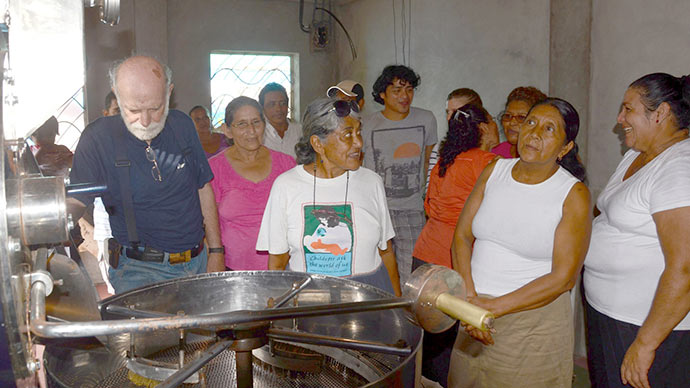 “The number one goal of BOSIA’s coffee program is to support the farmers. Number two is helping fund our community projects on Ometepe,” explained Jeanne Huber, who leads BOSIA’s coffee committee. Skill building and developing self-sufficiency are important components of how BOSIA helps farmers.
“The number one goal of BOSIA’s coffee program is to support the farmers. Number two is helping fund our community projects on Ometepe,” explained Jeanne Huber, who leads BOSIA’s coffee committee. Skill building and developing self-sufficiency are important components of how BOSIA helps farmers.
In 2013, BOSIA hired an agronomist to work with farmers to help them increase their yield and quality. The agronomist offers training and technical assistance and regularly evaluates the results to help farmers improve their harvest. Through the dedication of all involved parties, the relationship between BOSIA, its farmers, and their communities has evolved into a strong, reciprocal partnership. One of the consequences of this coffee enhancement initiative is that BOSIA is no longer able to market all of Ometepe’s increasing crop of organic coffee.
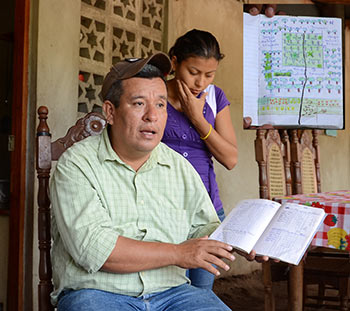 As David Adler and David Mitchell, two members of the BOSIA coffee committee, sat in discussions about what was going to happen with all the surplus coffee beans, they developed a plan — the surplus beans could be roasted on Ometepe and then sold domestically within Nicaragua. They could turn the surplus bean problem into a unique opportunity for creating an innovative business model — a Nicaraguan coffee roasting company located on Ometepe.
As David Adler and David Mitchell, two members of the BOSIA coffee committee, sat in discussions about what was going to happen with all the surplus coffee beans, they developed a plan — the surplus beans could be roasted on Ometepe and then sold domestically within Nicaragua. They could turn the surplus bean problem into a unique opportunity for creating an innovative business model — a Nicaraguan coffee roasting company located on Ometepe.
Adler and Mitchell approached Roberto Mairena, director of Proyecto Mano Amiga, a community center in the town of Balgüe on Ometepe. They proposed to host the roastery and coffee service business at Mairena’s center. Tostadores de Ometepe S.A., a new Nicaraguan corporation, was born. The business was launched with an Indiegogo crowd-funding campaign, loans from friends and, most importantly, the coffee farmers’ willingness to allow Tostadores de Ometepe to purchase green beans on a monthly basis for the first year of the new business. Operations are expected to begin next month. Roasting coffee on the island of its origin and marketing it to the growing tourism sector in Southwest Nicaragua, the business will direct all profits to providing a financial backbone for the community center, which has mainly relied on international donors.
Tostadores roasts and distributes its coffee within Nicaragua, and purchases green beans from the same two organic coffee farmer cooperatives as BOSIA. The beans are roasted in the Tostadores facility and then they sell the roasted coffee to hotels and restaurants in Southwest Nicaragua.
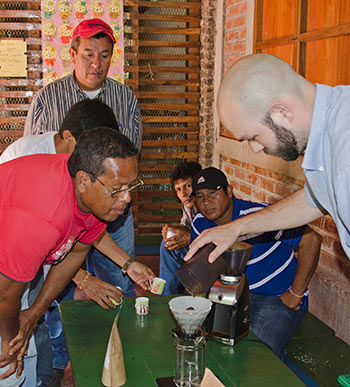 Tostadores is about more than just selling delicious coffee. The staff is dedicated to helping the company’s partners and the community on Ometepe in a sustainable way. As Adler explains, “The social commitment objective of Tostadores, with profits going to support local community programs, moves towards a future of self-reliance, and long-term sustainability of community and social programs.” “Tostadores,” Mitchell elaborated, “is dedicated to looking beyond the company’s financial interests to the broader interests of employees and their communities.”
Tostadores is about more than just selling delicious coffee. The staff is dedicated to helping the company’s partners and the community on Ometepe in a sustainable way. As Adler explains, “The social commitment objective of Tostadores, with profits going to support local community programs, moves towards a future of self-reliance, and long-term sustainability of community and social programs.” “Tostadores,” Mitchell elaborated, “is dedicated to looking beyond the company’s financial interests to the broader interests of employees and their communities.”
As the company grows, Tostadores will continue improving quality and service. But what will distinguish Tostadores from other, more traditional, coffee companies? Says Adler, “What is done with the profits and working closely together with everyone involved, from seed to cup, in achieving the quality of the ultimate product.”
What began as a conundrum for BOSIA, when they had more coffee beans than they could handle, has evolved into a responsible business focused on building relationships and strengthening communities through local economic development. Tostadores de Ometepe exhibits the potential that the coffee industry has to improve quality of life in communities across the globe.
Back to Top
Member Spotlight
Theo Chocolate
By Kaitlin Marshall
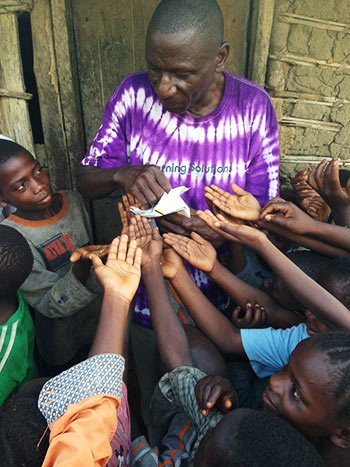 With over 300,000 square miles of arable land and a prime location along the equator to grow crops, the Democratic Republic of Congo (DRC) is rife with natural potential to be a competitive exporter. Currently, however, only 2% of the DRC’s arable land is being cultivated and the nation has the lowest per-capita domestic product in the world. Rebel groups and the Congolese army have been in conflict for years, decimating land and committing atrocities. Amidst the chaos, Theo Chocolate is investing in the future of Eastern Congo by purchasing Congolese cocoa beans.
With over 300,000 square miles of arable land and a prime location along the equator to grow crops, the Democratic Republic of Congo (DRC) is rife with natural potential to be a competitive exporter. Currently, however, only 2% of the DRC’s arable land is being cultivated and the nation has the lowest per-capita domestic product in the world. Rebel groups and the Congolese army have been in conflict for years, decimating land and committing atrocities. Amidst the chaos, Theo Chocolate is investing in the future of Eastern Congo by purchasing Congolese cocoa beans.
Founded in 2006, Theo Chocolate is the first organic, fair trade, bean-to-bar chocolate factory in North America. Theo’s innovative business model provides for cocoa farmers to be paid based on the quality of their beans. This gives farmers an incentive to produce higher quality cocoa, versus the global commodities market which views all cocoa as a fungible commodity. “If you’re a farmer that’s selling into the greater industry, and the industry thinks all cocoa is the same, then there’s no real incentive for you to process in this nice, fermented, and dry way — the market doesn’t value that,” explained Nathan Royston, Theo’s cocoa sourcing manager. The farmers and grower cooperatives that Theo sources from know that if they take the time to achieve Theo’s specified quality standards, they will receive a contracted price that is not vulnerable to the general unpredictability of the cocoa market.
A key component of Theo’s business model is that members of Theo’s sourcing team travel to meet with each of the company’s cocoa bean suppliers at least once per year. This enables Theo team members to explain how they want the cocoa they purchase to be farmed, implement strategies to train farmers, and interact with those responsible for harvesting the company’s key ingredient. Royston recently returned from a whirlwind 36 hours in the DRC with Joe Whinney, founder and CEO of Theo Chocolate. With over 3,000 certified cocoa farmers in the DRC, Royston and Whinney had to be deliberate and efficient with their time. They visited three different cocoa farms and met with their export partners and other stakeholders on the ground in DRC responsible for overseeing the quality of the cocoa beans Theo procures.
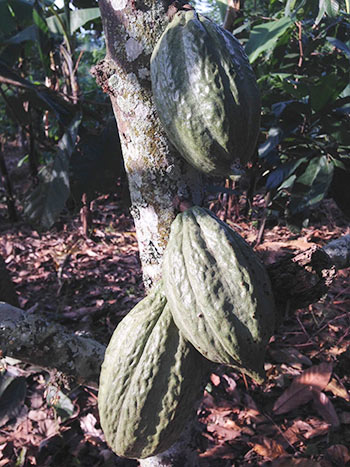 Esco Kivu, Theo’s primary Congolese cocoa supplier, has been in the DRC since the 1970’s. Esco’s team of field officers regularly goes into the field to train cocoa farmers and assist them with any technical issues they may have. “We can’t get out to every last farm and train all the thousands of farmers we are buying from,” said Royston, “but we can be very clear as a buyer what our specifications are and how to achieve them.” By being transparent with suppliers, Theo ensures that cocoa farmers understand Theo’s quality specifications. Royston and Whinney, along with Esco and support from Eastern Congo Initiative, an NGO partner focusing on advocacy and economic opportunities for the people of Congo, are identifying what kind of training farmers need in order to cultivate quality cocoa beans; training that will provide them with skills that lead to economic stability in a tumultuous region.
Esco Kivu, Theo’s primary Congolese cocoa supplier, has been in the DRC since the 1970’s. Esco’s team of field officers regularly goes into the field to train cocoa farmers and assist them with any technical issues they may have. “We can’t get out to every last farm and train all the thousands of farmers we are buying from,” said Royston, “but we can be very clear as a buyer what our specifications are and how to achieve them.” By being transparent with suppliers, Theo ensures that cocoa farmers understand Theo’s quality specifications. Royston and Whinney, along with Esco and support from Eastern Congo Initiative, an NGO partner focusing on advocacy and economic opportunities for the people of Congo, are identifying what kind of training farmers need in order to cultivate quality cocoa beans; training that will provide them with skills that lead to economic stability in a tumultuous region.
Political instability combined with the fact that it can take twelve weeks for Congolese cocoa to reach Seattle makes the DRC an extremely challenging place to do business. Investing in Congo, however, has been rewarding for Theo and Congolese farmers alike. Congolese cocoa has provided delicious new flavors to Theo’s chocolate bars, and the DRC has offered Theo an opportunity to apply the company’s business model of paying farmers based on quality in an area where people are in need of a stable source of income.
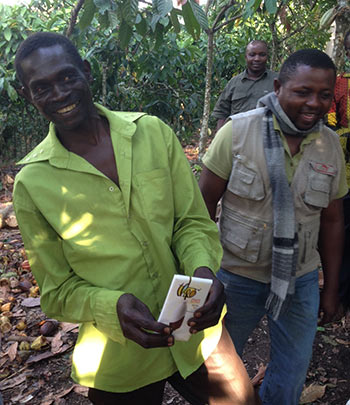 Cocoa, in addition to being a fast growing and high yield crop, can be considered “militia proof.” Cocoa has little value before being processed, so Congolese militants have very little incentive to steal the beans. Theo, by implementing training practices and paying quality premiums well beyond both the global market price and established fair trade premiums, has helped thousands of Congolese farmers develop sustainable livelihoods. “[The farmers] were very fast on the uptake,” said Royston. They are so optimistic in light of all the hardships they have overcome in the past.”
Cocoa, in addition to being a fast growing and high yield crop, can be considered “militia proof.” Cocoa has little value before being processed, so Congolese militants have very little incentive to steal the beans. Theo, by implementing training practices and paying quality premiums well beyond both the global market price and established fair trade premiums, has helped thousands of Congolese farmers develop sustainable livelihoods. “[The farmers] were very fast on the uptake,” said Royston. They are so optimistic in light of all the hardships they have overcome in the past.”
Perhaps the most rewarding part of Royston’s trip was meeting with communities that have been positively impacted by Theo’s work. Royston always brings Theo chocolate bars to share with cocoa farmers and their communities, the majority of whom have never tasted chocolate. He reflected on how fun it is to watch people’s reactions when they taste a chocolate bar, especially the kids. Royston also said one of the most inspirational parts of his journey was reading a letter drafted by the Farmer Premium Committee explaining what they decided to do with their fair trade premiums. Instead of keeping them, the farmers requested that the premiums go back into their community to build roads, schools and a clinic. “It was so moving that this was their collective decision; they want their entire community to be better supported by the premiums they are earning from their cocoa.” By ensuring the farmers they source from receive support, Theo has formed partnerships that not only lead to delicious chocolate, but also have the power to transform communities.
Back to Top
Welcome New Members
Please welcome our newest Global Washington members. Take a moment to familiarize yourself with their work and consider opportunities for support and collaboration!
PricewaterhouseCoopers: PwC brings a global perspective along with in-depth knowledge of local, state and U.S. issues, focusing on audit and assurance, tax and consulting services. Additionally, in the U.S., PwC concentrates on 16 key industries and provides targeted services that include — but are not limited to — human resources, deals, forensics, and consulting services. www.pwc.com
World Vision: World Vision is a Christian humanitarian organization dedicated to working with children, families, and their communities worldwide to reach their full potential by tackling the root causes of poverty and injustice. www.worldvision.org
Back to Top
Member Events
April 22: Pangea // Pangea House Party
April 25: OneWorld Now! // Get Global Youth Conference
April 28: One Equal Heart Foundation // Indigenous Women Create a Sustainable Solidarity Economy
April 28 – 29: Seattle Metropolitan Chamber of Commerce // IN-NW 2015: Digital Innovation + Leadership Conference
April 30: World Trade Center Seattle // From the CEO’s Perspective Series: Women and Leadership
May 1: UW School of Law // The Post-2015 Development Agenda: From the Millennium Development Goals to the Sustainable Development Goals
May 2: Global Visionaries // 14th Annual Auction
May 9: World Concern // Free them 5K
May 16: Associates in Cultural Exchange // The Run About the World
Back to Top
Career Center
Highlighted Positions
Donor Relations Coordinator – Ashesi University Foundation
Philanthropy Coordinator – Landesa
Senior Marketing and Communications Manager – Marine Stewardship Council
Account Manager II, Donor Relations – World Vision
For more jobs and resources, visit https://globalwa.org/resources/careers-in-development/
Back to Top
GlobalWA Events
April 30: Networking Happy Hour with Friends of GlobalWA, Humanosphere and World Affairs Council
May 13: On the Human Rights Frontier: The Global Struggle for LGBT Equality
May 20: New Member Orientation
Back to Top
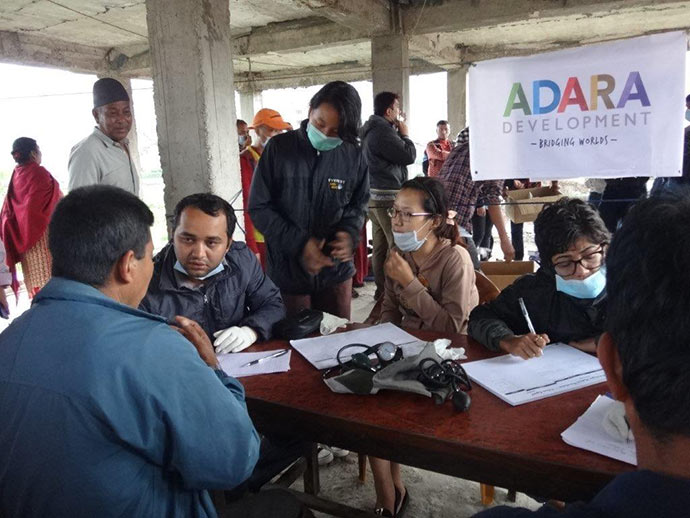
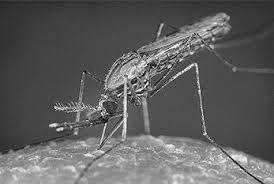 World Malaria Day was established in 2007 as a way to mobilize advocates and citizens around the world to help put a stop to the disease. This year’s theme is Invest in the future, Defeat malaria, which encourages people to help close the malaria funding gap. 2015 also marks the ten-year anniversary of the President’s Malaria Initiative (PMI). The goal of the PMI was to reduce malaria-related mortality by 50% across fifteen high-burden countries in Sub-Saharan Africa through a rapid scale-up of treatment and prevention. The PMI’s achievements include the procurement of 40 million insecticide treated mosquito nets and 48 million antimalarial treatments.
World Malaria Day was established in 2007 as a way to mobilize advocates and citizens around the world to help put a stop to the disease. This year’s theme is Invest in the future, Defeat malaria, which encourages people to help close the malaria funding gap. 2015 also marks the ten-year anniversary of the President’s Malaria Initiative (PMI). The goal of the PMI was to reduce malaria-related mortality by 50% across fifteen high-burden countries in Sub-Saharan Africa through a rapid scale-up of treatment and prevention. The PMI’s achievements include the procurement of 40 million insecticide treated mosquito nets and 48 million antimalarial treatments. Seattle is also known for being the epicenter of international development and, given that 90% of the coffee grown around the world comes from developing countries, it’s no surprise that several Global Washington members work with coffee growers to make a more equitable, sustainable value chain. Coffee serves as the economic livelihood for over 25 million people. Challenges facing growers include a lack of access to finance, underdeveloped technical skills to combat disease, volatility of the global market and lack of access to that information, and crop vulnerability due to climate change.
Seattle is also known for being the epicenter of international development and, given that 90% of the coffee grown around the world comes from developing countries, it’s no surprise that several Global Washington members work with coffee growers to make a more equitable, sustainable value chain. Coffee serves as the economic livelihood for over 25 million people. Challenges facing growers include a lack of access to finance, underdeveloped technical skills to combat disease, volatility of the global market and lack of access to that information, and crop vulnerability due to climate change.
 It is no surprise that the SCAA returned to Washington state, after holding their 2014 annual event in Seattle. Home to a thriving coffee culture and some of the industry’s most recognized brands, the Daily Beast
It is no surprise that the SCAA returned to Washington state, after holding their 2014 annual event in Seattle. Home to a thriving coffee culture and some of the industry’s most recognized brands, the Daily Beast  The group built a water treatment-appropriate technology for a farm in the CECOSEMAC cooperative. CECOSEMAC is a second order cooperative of over 300 smallholder coffee producers formed into six cooperatives in the Matagalpa region of Nicaragua. Upon their return to Seattle, the SU team presented findings and next steps at a campus event, mingled with other groups working in the coffee space at a GlobalWA reception, and attended various meetings and lectures at the SCAA expo.
The group built a water treatment-appropriate technology for a farm in the CECOSEMAC cooperative. CECOSEMAC is a second order cooperative of over 300 smallholder coffee producers formed into six cooperatives in the Matagalpa region of Nicaragua. Upon their return to Seattle, the SU team presented findings and next steps at a campus event, mingled with other groups working in the coffee space at a GlobalWA reception, and attended various meetings and lectures at the SCAA expo. In San Antonio, the team interviewed multiple farmers and staff of CECOSEMAC to learn what it means to be a coffee farmer in Nicaragua. Braden Wild, one of the SU students involved in the project, talked about how the group began understanding the hardships farmers face, including ones stemming from Fair Trade certification. As the group learned about Fair Trade coffee from the farmers’ point of view, they began to formulate a new business model. Soon after, the More than Fair Trade project was born.
In San Antonio, the team interviewed multiple farmers and staff of CECOSEMAC to learn what it means to be a coffee farmer in Nicaragua. Braden Wild, one of the SU students involved in the project, talked about how the group began understanding the hardships farmers face, including ones stemming from Fair Trade certification. As the group learned about Fair Trade coffee from the farmers’ point of view, they began to formulate a new business model. Soon after, the More than Fair Trade project was born. In addition to cafés on the Seattle University campus, the SU group is exploring the sale of whole beans to off-campus locations, making Café Ambiental available to a wider audience. The coffee would build upon the Fair Trade foundation of social and environmental sustainability and add a social enterprise element by providing the market incentives CECOSEMAC’s farmers need to achieve their goal of producing world-class specialty coffee. More than Fair Trade involves deep connections between producer, buyer and consumer and it offers a promising model of how to best address the challenges facing the global coffee industry.
In addition to cafés on the Seattle University campus, the SU group is exploring the sale of whole beans to off-campus locations, making Café Ambiental available to a wider audience. The coffee would build upon the Fair Trade foundation of social and environmental sustainability and add a social enterprise element by providing the market incentives CECOSEMAC’s farmers need to achieve their goal of producing world-class specialty coffee. More than Fair Trade involves deep connections between producer, buyer and consumer and it offers a promising model of how to best address the challenges facing the global coffee industry. As the Regional CEO of Latin America and the Caribbean, Alberto Solano has more than twelve years of experience in microfinance. A Fellow of the Aspen Institute’s Central American Leadership Initiative, Solano has been instrumental in designing
As the Regional CEO of Latin America and the Caribbean, Alberto Solano has more than twelve years of experience in microfinance. A Fellow of the Aspen Institute’s Central American Leadership Initiative, Solano has been instrumental in designing  It is important to note that the goal of Solano’s team is not to turn everyone into a coffee farmer. The data collection and extension services also help determine if coffee production is a viable business model for farmers. If not, Grameen works with them to develop alternatives.
It is important to note that the goal of Solano’s team is not to turn everyone into a coffee farmer. The data collection and extension services also help determine if coffee production is a viable business model for farmers. If not, Grameen works with them to develop alternatives. When it comes to coffee, Solano argues that ethical sourcing combines environmental and social sustainability in a way that goes beyond a mere certification label; it transforms coffee from a commodity to a human connection between farmer and consumer. In a world of large-scale plantations that achieve economies of scale but level a toll on the environment and local people, it recognizes the role of smallholder farmers in the overall health of the entire coffee industry. It attempts to improve the lives of these farmers so they can keep their land, send their children to school, and continue to produce the unique flavors we have come to expect when we step into a café.
When it comes to coffee, Solano argues that ethical sourcing combines environmental and social sustainability in a way that goes beyond a mere certification label; it transforms coffee from a commodity to a human connection between farmer and consumer. In a world of large-scale plantations that achieve economies of scale but level a toll on the environment and local people, it recognizes the role of smallholder farmers in the overall health of the entire coffee industry. It attempts to improve the lives of these farmers so they can keep their land, send their children to school, and continue to produce the unique flavors we have come to expect when we step into a café. “The number one goal of BOSIA’s coffee program is to support the farmers. Number two is helping fund our community projects on Ometepe,” explained Jeanne Huber, who leads BOSIA’s coffee committee. Skill building and developing self-sufficiency are important components of how BOSIA helps farmers.
“The number one goal of BOSIA’s coffee program is to support the farmers. Number two is helping fund our community projects on Ometepe,” explained Jeanne Huber, who leads BOSIA’s coffee committee. Skill building and developing self-sufficiency are important components of how BOSIA helps farmers. As David Adler and David Mitchell, two members of the BOSIA coffee committee, sat in discussions about what was going to happen with all the surplus coffee beans, they developed a plan — the surplus beans could be roasted on Ometepe and then sold domestically within Nicaragua. They could turn the surplus bean problem into a unique opportunity for creating an innovative business model — a Nicaraguan coffee roasting company located on Ometepe.
As David Adler and David Mitchell, two members of the BOSIA coffee committee, sat in discussions about what was going to happen with all the surplus coffee beans, they developed a plan — the surplus beans could be roasted on Ometepe and then sold domestically within Nicaragua. They could turn the surplus bean problem into a unique opportunity for creating an innovative business model — a Nicaraguan coffee roasting company located on Ometepe. Tostadores is about more than just selling delicious coffee. The staff is dedicated to helping the company’s partners and the community on Ometepe in a sustainable way. As Adler explains, “The social commitment objective of Tostadores, with profits going to support local community programs, moves towards a future of self-reliance, and long-term sustainability of community and social programs.” “Tostadores,” Mitchell elaborated, “is dedicated to looking beyond the company’s financial interests to the broader interests of employees and their communities.”
Tostadores is about more than just selling delicious coffee. The staff is dedicated to helping the company’s partners and the community on Ometepe in a sustainable way. As Adler explains, “The social commitment objective of Tostadores, with profits going to support local community programs, moves towards a future of self-reliance, and long-term sustainability of community and social programs.” “Tostadores,” Mitchell elaborated, “is dedicated to looking beyond the company’s financial interests to the broader interests of employees and their communities.” With over 300,000 square miles of arable land and a prime location along the equator to grow crops, the Democratic Republic of Congo (DRC) is rife with natural potential to be a competitive exporter. Currently, however, only 2% of the DRC’s arable land is being cultivated and the nation has the lowest per-capita domestic product in the world. Rebel groups and the Congolese army have been in conflict for years, decimating land and committing atrocities. Amidst the chaos,
With over 300,000 square miles of arable land and a prime location along the equator to grow crops, the Democratic Republic of Congo (DRC) is rife with natural potential to be a competitive exporter. Currently, however, only 2% of the DRC’s arable land is being cultivated and the nation has the lowest per-capita domestic product in the world. Rebel groups and the Congolese army have been in conflict for years, decimating land and committing atrocities. Amidst the chaos,  Esco Kivu, Theo’s primary Congolese cocoa supplier, has been in the DRC since the 1970’s. Esco’s team of field officers regularly goes into the field to train cocoa farmers and assist them with any technical issues they may have. “We can’t get out to every last farm and train all the thousands of farmers we are buying from,” said Royston, “but we can be very clear as a buyer what our specifications are and how to achieve them.” By being transparent with suppliers, Theo ensures that cocoa farmers understand Theo’s quality specifications. Royston and Whinney, along with Esco and support from Eastern Congo Initiative, an NGO partner focusing on advocacy and economic opportunities for the people of Congo, are identifying what kind of training farmers need in order to cultivate quality cocoa beans; training that will provide them with skills that lead to economic stability in a tumultuous region.
Esco Kivu, Theo’s primary Congolese cocoa supplier, has been in the DRC since the 1970’s. Esco’s team of field officers regularly goes into the field to train cocoa farmers and assist them with any technical issues they may have. “We can’t get out to every last farm and train all the thousands of farmers we are buying from,” said Royston, “but we can be very clear as a buyer what our specifications are and how to achieve them.” By being transparent with suppliers, Theo ensures that cocoa farmers understand Theo’s quality specifications. Royston and Whinney, along with Esco and support from Eastern Congo Initiative, an NGO partner focusing on advocacy and economic opportunities for the people of Congo, are identifying what kind of training farmers need in order to cultivate quality cocoa beans; training that will provide them with skills that lead to economic stability in a tumultuous region. Cocoa, in addition to being a fast growing and high yield crop, can be considered “militia proof.” Cocoa has little value before being processed, so Congolese militants have very little incentive to steal the beans. Theo, by implementing training practices and paying quality premiums well beyond both the global market price and established fair trade premiums, has helped thousands of Congolese farmers develop sustainable livelihoods. “[The farmers] were very fast on the uptake,” said Royston. They are so optimistic in light of all the hardships they have overcome in the past.”
Cocoa, in addition to being a fast growing and high yield crop, can be considered “militia proof.” Cocoa has little value before being processed, so Congolese militants have very little incentive to steal the beans. Theo, by implementing training practices and paying quality premiums well beyond both the global market price and established fair trade premiums, has helped thousands of Congolese farmers develop sustainable livelihoods. “[The farmers] were very fast on the uptake,” said Royston. They are so optimistic in light of all the hardships they have overcome in the past.”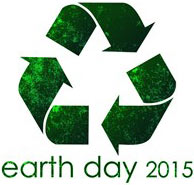 The first Earth Day took place on April 22, 1970 and is widely credited with launching the modern environmental movement. After witnessing the devastation of the 1969 oil spill in Santa Barbara, California, Gaylord Nelson, a U.S. Senator from Wisconsin, was inspired to mobilize citizens to force environmental protection onto the national political agenda. Nelson persuaded Pete McCloskey, a fellow congressman, to serve as his co-chair and recruited Denis Hayes as national coordinator. Hayes built a national staff of 85 to promote Earth Day events across the country. On the first Earth Day, 20 million Americans took to the streets to demand protection for the environment. In 1990, Hayes organized another campaign and focused his efforts globally. His campaign mobilized 200 million people in 141 countries. Earth Day was transformed from an annual national event to an annual global celebration.
The first Earth Day took place on April 22, 1970 and is widely credited with launching the modern environmental movement. After witnessing the devastation of the 1969 oil spill in Santa Barbara, California, Gaylord Nelson, a U.S. Senator from Wisconsin, was inspired to mobilize citizens to force environmental protection onto the national political agenda. Nelson persuaded Pete McCloskey, a fellow congressman, to serve as his co-chair and recruited Denis Hayes as national coordinator. Hayes built a national staff of 85 to promote Earth Day events across the country. On the first Earth Day, 20 million Americans took to the streets to demand protection for the environment. In 1990, Hayes organized another campaign and focused his efforts globally. His campaign mobilized 200 million people in 141 countries. Earth Day was transformed from an annual national event to an annual global celebration.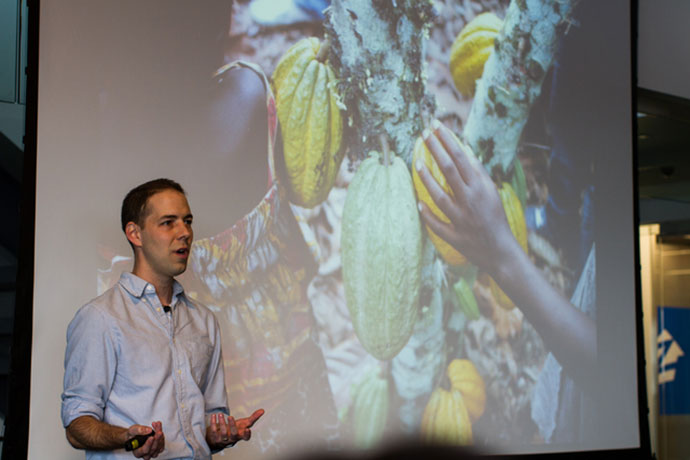
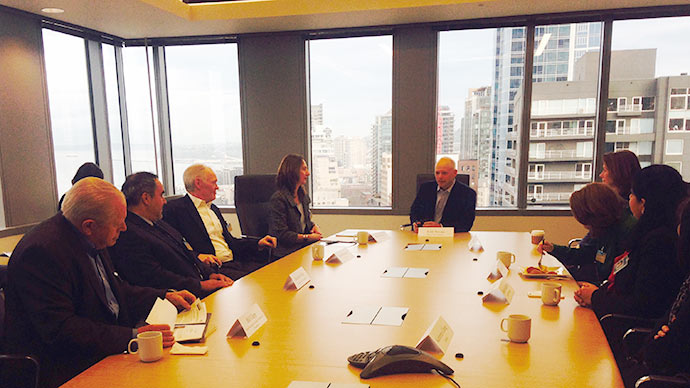 Following three Seattle-based groups making Ethisphere’s 2015 list of the
Following three Seattle-based groups making Ethisphere’s 2015 list of the 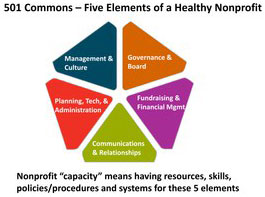 More and more voices from within philanthropy are arguing that funders need to stop directing the specific uses of their funds and provide general operating grants. Despite studies that show this to be the most effective type of funding, the percentage of general operating grants has been stagnant for the last 10 years.
More and more voices from within philanthropy are arguing that funders need to stop directing the specific uses of their funds and provide general operating grants. Despite studies that show this to be the most effective type of funding, the percentage of general operating grants has been stagnant for the last 10 years.